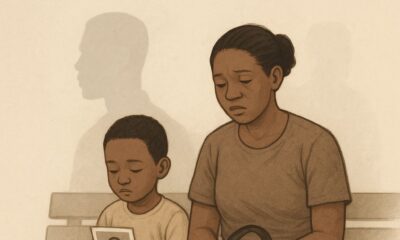Features
Osasogie Omogui: Daddy Issues
 The father-daughter bond is a feeling I don’t understand and can’t relate to. I feel weird when I hear girls explain the bond between them and their fathers. Some girls seem to be closer to their fathers than their mothers thereby being termed ‘Daddy’s Girl(s)’. I can’t relate to any level of father-daughter relationship with my father. For your father to be your first love or superhero? I have come to understand that goes beyond settling bills and providing for the family. For some of us with distant fathers or without fathers at all, the society terms our situation as one with ‘Daddy Issues’. More frequently I’ve heard, ‘She’s like that because she has daddy issues.
The father-daughter bond is a feeling I don’t understand and can’t relate to. I feel weird when I hear girls explain the bond between them and their fathers. Some girls seem to be closer to their fathers than their mothers thereby being termed ‘Daddy’s Girl(s)’. I can’t relate to any level of father-daughter relationship with my father. For your father to be your first love or superhero? I have come to understand that goes beyond settling bills and providing for the family. For some of us with distant fathers or without fathers at all, the society terms our situation as one with ‘Daddy Issues’. More frequently I’ve heard, ‘She’s like that because she has daddy issues.
What exactly is having Daddy Issues? Our understanding of “daddy issues” has been defined and controlled by what men think are women’s failings. But it’s the ways in which men have failed that have made things this way. It’s on women now to define and understand our suffering, so here’s a try.
Daddy issues: the issue of men finding it easy to throw away the responsibility of fatherhood, the issue of all of us excusing them. We locate the problem of abandonment in the abandoned.
The narrative I’d been told my whole life is that because one has been neglected and mistreated by a father, she would suffer forever from daddy issues. This is actually a complete lie. The person who suffered from daddy issues wasn’t me. I have friendships, goals, a career, a full heart, eager to give, can be trusting.
At some point in your life, you may have heard the term “daddy issues” used in a certain context. Most people in our society today use it to describe a woman who tends toward promiscuity.
Is it true? Maybe. Is it the only explanation? No. That’s because promiscuity is not directly linked to daddy issues.
There are a lot of reasons a woman might choose to have multiple sex partners or be indiscriminate about the partners she chooses, but it’s not necessarily related to having issues with her father.
Our relationships with our parents are fundamental, for better or worse. They’re bound to inform all our romantic relationships. It sounds like you’re recognizing some unhealthy behaviours — and recognizing how they’re affecting your relationships. You’re already growing more self-aware about your impulses and triggers. That’s all great. But now you’ve got more work to do.
It sounds like you’re ready for therapy. An ongoing, guided conversation with a professional could help you unpack these feelings so your past isn’t always interfering with your present. A fresh perspective might help. If therapy isn’t right for you, make sure you have good friends (or family) who can hear you out. In general, deep-seated issues aren’t cured with quick fixes.
But here are a couple general pieces of advice from my own life:
Be upfront with your partners when your daddy issues crop up. It’s always better to explain an outburst than leaving it a mystery. Odds are, your partner will get it. We all have daddy issues. And mommy issues too. Everyone’s issues are just different, depending on how, as Larkin writes, those mums and dads might have messed you up. If you talk honestly about who you are and where you come from, it might help you to learn more about yourself and connect with your partner. And if you tell your partner why certain things upset you, he or she will understand why they should avoid them.
When you’re fearing abandonment, don’t just think about your father. Remember those people who haven’t abandoned you too: the friends and family who stick by you, even when he doesn’t. You know, on some level, that every guy isn’t your dad — but sometimes, it’s easier to remember that when you can point to some counterexamples.
Be patient. It’s heartening to hear that you’re reckoning with your daddy issues, but they’re not going away. Parental issues stretch back to the womb, by definition. It’s how we’re hard-wired and, for most of us, that messy wiring can take a lifetime to untangle.
None of this is particularly surprising, even as I thought about my own understanding of daddy issues. The term “daddy issues” has been deep-rooted as to become commonplace, almost forgotten—one of those colloquialisms that no longer seems significant or relevant.
By the simple principle of the fact that my dad could not handle being a dad, he was the one who had daddy issues, not me. I just happened to be raised in his crossfire.
Let me back up a bit. I’ve been thinking a lot about daddy issues because, well, like lots of women, I was wondering if I had them. I was roped in by this patriarchal narrative, so subtle it haunted me like a ghost. It’s incredible the paranoia that women live with every day—Do I act this way? Am I crazy? What is crazy anyway? Who is responsible for the way I am? Is the way I am right or wrong? Should I be this way or that? Did I do the right “womanly” thing today? Was the “womanly” thing the way the men wanted me to act or the way the women wanted me to act? Was I true to myself and was that enough? Who am I at all?
Am I a good woman? Do I have daddy issues? Turn that around, and then we can talk.
Photo Credit: Gary Cooper | Dreamstime

















